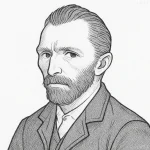“It is not the language of painters but the language of nature which one should listen to, the feeling for the things themselves, for reality is more important than the feeling for pictures.”

- March 30, 1853 – July 29, 1890
- Dutch
- Painter, Post-Impressionist Artist, Pioneer of Modern Art
table of contents
Quote
“It is not the language of painters but the language of nature which one should listen to, the feeling for the things themselves, for reality is more important than the feeling for pictures.”
Explanation
In this quote, Van Gogh argues that true artistic inspiration should come from nature and reality, not from the conventions or trends of other artists. The “language of painters” refers to formal technique, artistic jargon, or imitation, while the “language of nature” represents authentic observation and emotional connection to the world as it truly is. He insists that art should be rooted in real experience and honest feeling, not in mere stylistic mimicry.
This philosophy guided Van Gogh’s work. He often painted directly from life—fields, skies, peasants, everyday objects—with raw emotional intensity. He did not aim to flatter or conform to academic standards. Instead, he sought to express the essence of what he saw and felt, capturing not just appearance but the spirit of things. His approach defied norms but revealed a deeper truth, which is why his art remains powerful today.
In a modern context, the quote urges creators of all kinds to trust their direct experience and connection to the real world, rather than being overly influenced by trends, styles, or expectations. Whether in painting, writing, or any form of expression, authenticity matters more than imitation. Van Gogh reminds us that true artistry begins with seeing the world clearly and feeling it deeply—before trying to depict it at all.
Would you like to share your impressions or related stories about this quote in the comments section?
